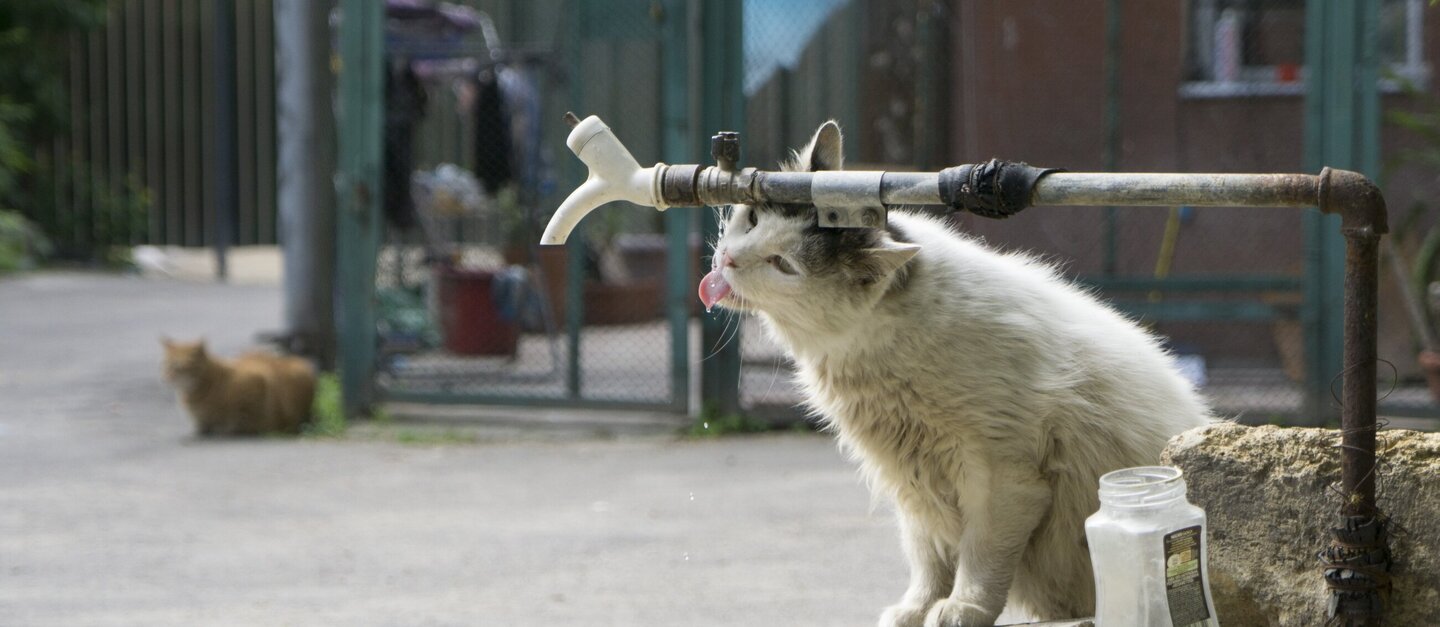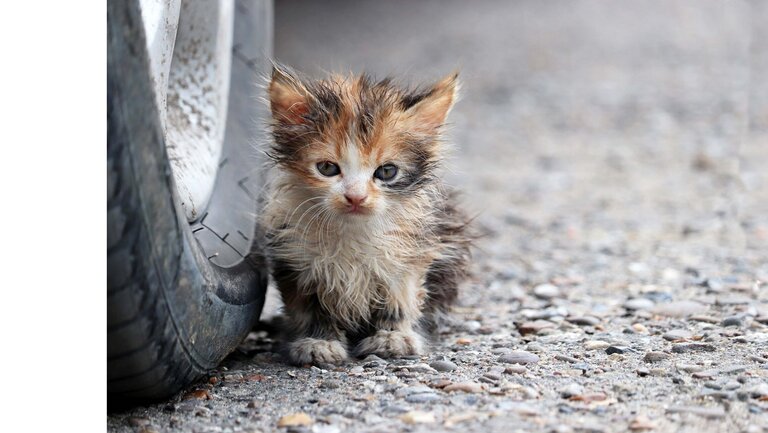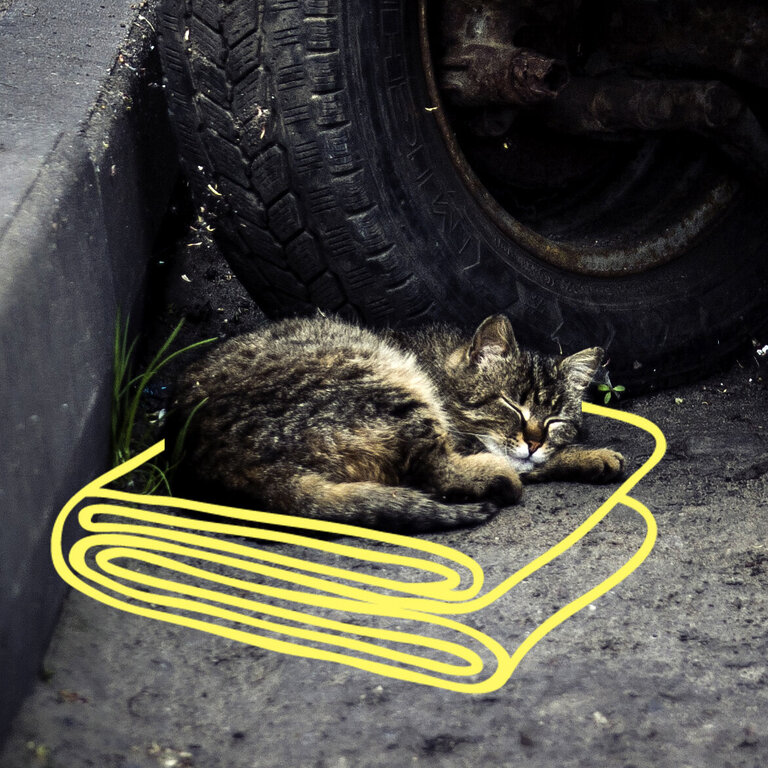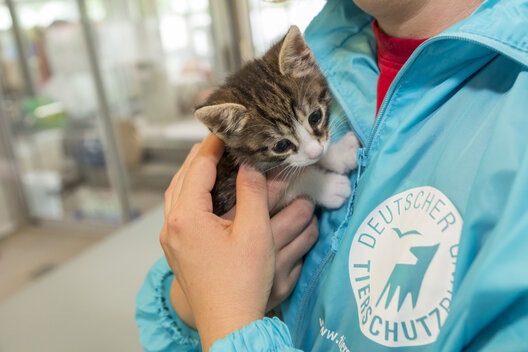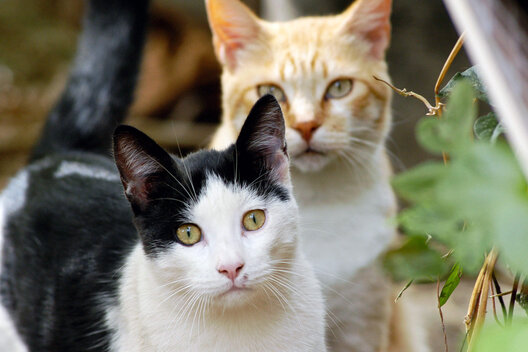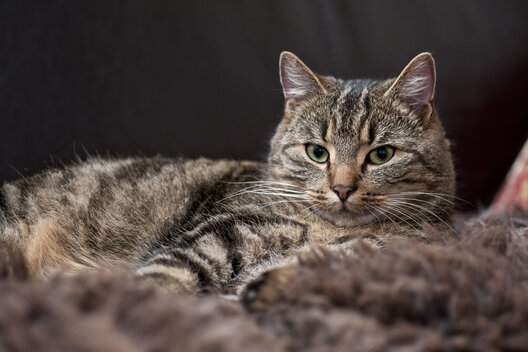Millions of cats living a life out on the streetsHow feral cats suffer in Germany
Many people only know feral cats from abroad. But there are millions of homeless strays in this country. Over the years, the suffering of feral cats has become one of the biggest animal welfare problems in Germany.
Feral cats in Germany suffer in secret. They are usually fearful of humans, live on overgrown properties, abandoned factory sites or cemeteries and avoid people. As a result, the suffering of these animals remains invisible to many, but not to our member associations. 92 percent of them have direct contact to stray cats.1 This shows that the suffering of feral cats is a nationwide problem.
percent of feral cats are sick when animal welfare organizations have them examined for the first time.
years of age can a cat lifespan be up to. On the street, their life expectancy is often just a few months.
of 3 animal shelters are (almost) permanently full.
million offspring can one cat produce in ten years.
Feral cats suffer from diseases
99 percent of feral cats are sick. This is reported by our member associations, most of which deal with the animals on a daily basis. One in 20 is even terminally ill.1 Feral cats most often suffer from parasites, malnutrition and infectious diseases such as cat flu. Although the cats are usually seriously ill, they can usually be cured by vets. But for this to happen, helpful animal rights activists have to find the animals in the first place and catch them in time. The less time a cat has to spend alone on the street, the greater the chance that the treatment will be successful.
Feral cats are dependent on humans
Feral cats are the offspring of domestic cats that have not been neutered and have been allowed to roam free, or of abandoned or left-behind animals. They are therefore dependent on help from humans: As a domesticated species, they are not as adept at hunting as their wild ancestors. In any case, they usually find little prey and are unable to provide for themselves and their offspring in the long term. A vicious circle begins: poorly nourished feral cats fall ill more quickly. Thus weakened, the animals are even less successful at hunting. Inevitably, many feral cats are malnourished and have little resistance to disease.
Animal welfare organizations feed and care for feral cats
Many member associations of the German Animal Welfare Federation look after or support feeding stations where they feed the feral cats. They also check how many of the animals are living in their environment and how they are doing health-wise. If necessary, they can also catch feral cats there, give them medical treatment, neuter them and have them identified. They then register them with FINDEFIX, the pet register of the German Animal Welfare Federation, and release them back into their home territory. In this way, the free-roaming cats do not continue to multiply, are less likely to contract certain diseases and compete less for food and shelter.
Why neutering is so important
The most important effect of neutering is that cats cannot reproduce uncontrollably. If as many feral and free-roaming cats from private households as possible are neutered, this reduces the feral cat population in the long term. This reduces the number of cats that have to fight for their survival. Although feral cats are usually sick and generally do not live as long as animals kept by us, they constantly have offspring if they are not neutered. They are sexually mature at around six months of age. Female cats come into heat several times a year, i.e. they are ready to mate. If the animals mate during this phase, the cat gives birth to an average of four to six kittens after 63 to 66 days. The chances of the kittens surviving are low if they are born on the street. Nevertheless, cat populations continue to grow unless humans intervene. Assuming that a cat has two litters per year and three kittens survive per litter, after ten years one cat can produce around 200 million offspring.
Help for feral cats is not enough
Cities and municipalities react very differently to the problem of free-roaming cats. Some refuse to provide any help for the animals in need. They even forbid feeding the feral cats. Others are more open-minded. They oblige cat owners to have their free-roaming cats neutered, identified and registered, give grants to animal welfare organizations that carry out neutering campaigns and work with them to solve the problems. Some federal states also provide financial support for neutering free-roaming cats. Overall, however, the support from local authorities and the federal states has so far been nowhere near enough to cover the costs of neutering, microchipping and caring for the cats. The animal welfare organizations that have the feral cats neutered and microchipped, also with financial support from the German Animal Welfare Federation or its regional associations, are therefore left with some of the costs. The additional work alongside the day-to-day business in the animal shelters pushes them to their limits. This work is only possible with the help of donations and the support of volunteer animal lovers.
What you can do for free-roaming cats
Have your free-roaming cat neutered if you have not already done so. This will prevent further offspring from increasing the suffering on the streets. Neutering male and female cats is now a routine procedure and has many benefits. You should also have your cat identified and register it with FINDEFIX, the German Animal Welfare Federation's pet register - even if it only lives indoors. Your local animal welfare association can use all the help it can get and will be delighted if you support its work. Donate locally for the neutering of feral cats or at jetzt-katzen-helfen.de/spenden for the German Animal Welfare Federation's cat protection donation project. You can also post a story about feral cats on your social media channels. This will help to educate as many people as possible.
This is what the German Animal Welfare Federation demands
There is still no nationwide regulation for more cat protection. So far, the federal government has shifted the issue onto the federal states and local authorities. That is why the German Animal Welfare Federation has long been calling for a nationwide regulation for more cat protection. This could be part of a comprehensive regulation for the protection of pets. Such a pet protection ordinance should, among other things, require the nationwide neutering of all free-roaming cats and ensure that owners are only allowed to take in animals if they have a certificate of competence.
The state must finally recognize the important work of animal rights activists in animal welfare associations and animal shelters and support them financially. It must not leave them on their own to fulfill the state goal of animal welfare and leave them to bear the costs of caring for and neutering street cats, for example.
Sources and further information
1 The figures come from a survey of animal welfare organizations affiliated with the German Animal Welfare Federation in 2022. You can find more information on this in our Cat Protection Report. (available in German only)

